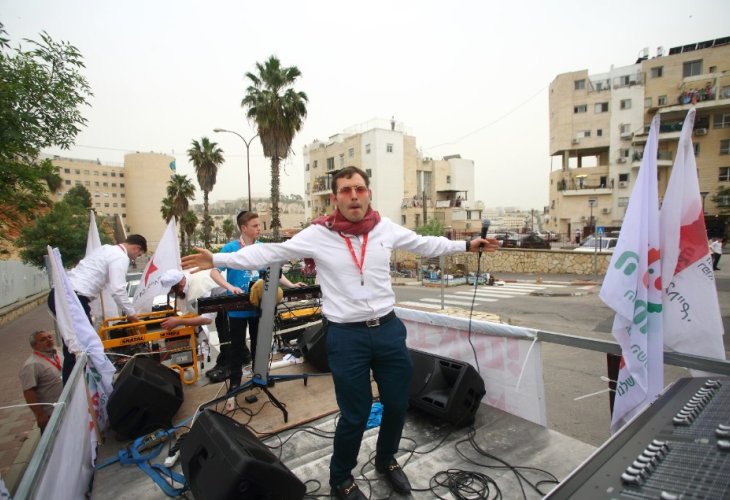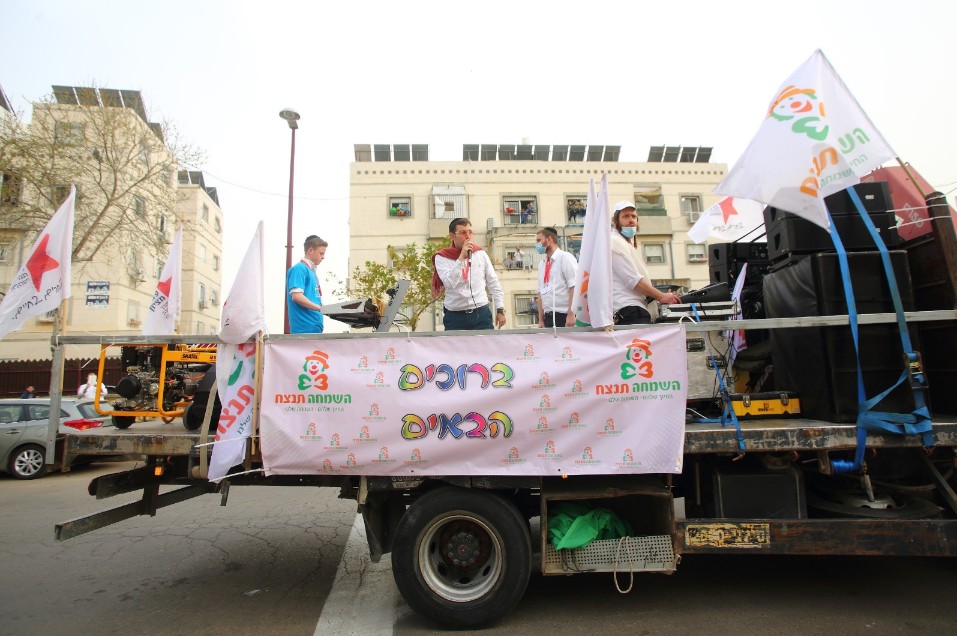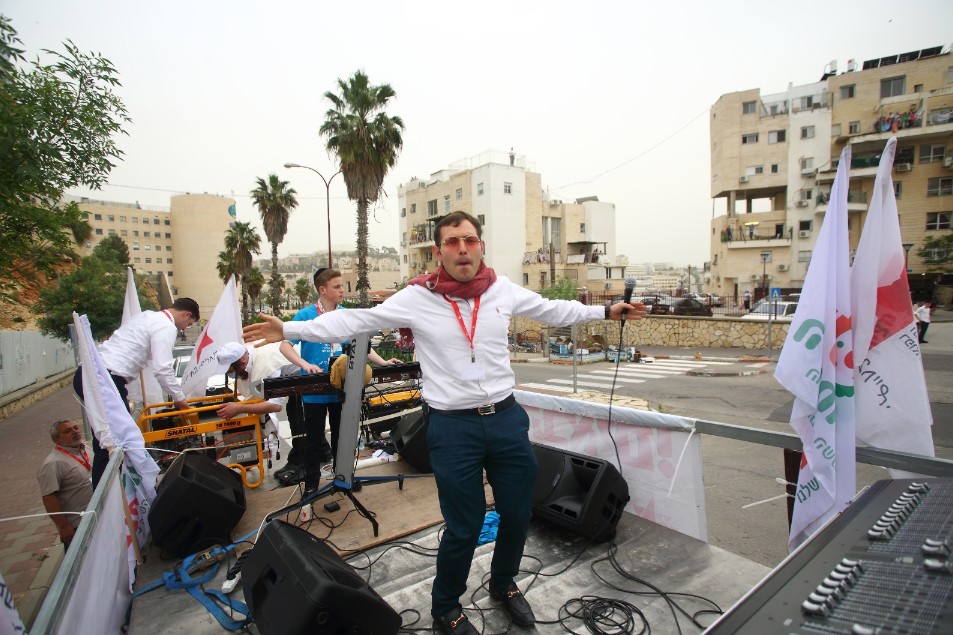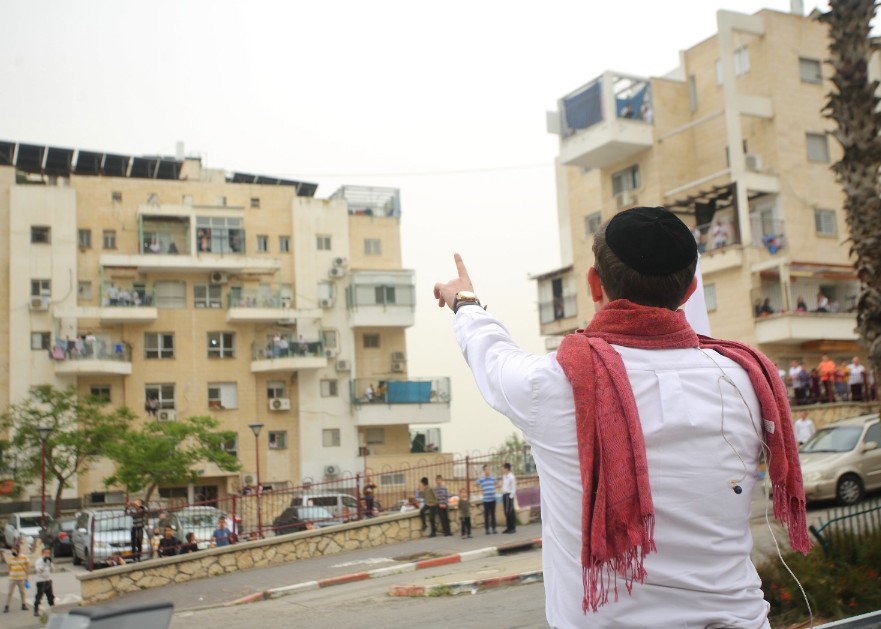Singer Ruli Dikman: "Suddenly, a Policeman Burst into My House via a Ladder from the Roof"
On the eve of Passover and during the holiday, the people of Israel watched the Dikman brothers, Ruli and Yoeli, singing and dancing on the celebration truck. Who else got a visit from them? And who did they discover at the Lavi Hotel? Ruli tells it all, including the drama that unfolded at the end of the holiday.

"The Dikmans." On the eve of Passover, when Israeli households are busy with holiday preparations and cleaning, there wasn't a single window or balcony in the religious concentrations across the country where they weren't seen dancing and singing from the celebration truck. This truck brought out all the residents from their homes for a few moments of joy, with Yoeli on the keyboard and Ruli on the microphone. "I can tell you that in the midst of all this joy we brought to the streets, I noticed some elderly Jews watching us with tears in the corners of their eyes," Ruli Dikman shares emotionally. "It's a great satisfaction to know that amidst all this great uncertainty that everyone is experiencing, we were able to bring joy and uplift the hearts of the people of Israel," he adds.
However, besides the privilege of bringing joy to the hearts of the people of Israel, the Dikman brothers also experienced something less pleasant. Between one celebration and another, while praying with devotion through a live broadcast together with all the people of Israel, they experienced a police raid on their apartment, with ladders through the roof, as if they were the last of the criminals.
They Are the Sick, We Are the Isolated
Ruli, how did the idea of the dancing truck come about?
"The idea was born and began in Jerusalem, with Hasidic music personality Menachem Toker. He understood that, with all due respect to COVID-19, we cannot let the people of Israel generally, and the children of Israel in particular, sink into sadness, especially before a holiday. He organized and initiated the celebration truck in cooperation with the Jerusalem municipality. Besides other singers who alternated, we were also invited to be part of this special project, and we decided to join. We traveled to Jerusalem, got on the truck, and played and brought joy to the streets of Jerusalem, to the delight of the children peeping longingly from the balconies and windows. From there, offers started coming in from other municipalities. Among others, we were approached by the youth department of the Bnei Brak municipality, and together with those involved in the work, we jumped at the opportunity, quickly promoting the celebration truck to bring joy to the people of Bnei Brak, as we stood on the truck for ten hours a day."
To be honest, as a Bnei Brak resident who also watched the truck from behind bars, I was a bit disappointed. By the time we managed to open the rickety shutters at home and the kids stopped fighting over who gets the window first, the truck had already passed by.
This is my chance to ask you - why didn't you stop on each street for a longer time, or even five minutes, so the public could enjoy a bit more from a live performance under their house?
"That's an excellent question," he replies. "But after we saw that it caused crowding of children and people in the street, we realized we were achieving the opposite goal, endangering public safety, and in complete opposition to the health ministry's guidelines. Therefore, we preferred to bring joy for a short time, safely, rather than for a long time, dangerously. Also, imagine if I stopped for a few minutes on every street; we wouldn't reach all the residents in the city, leading to inequality. So everyone got a little joy, rather than some getting a lot of joy."
In which other cities did you manage to perform?
"Jerusalem was the first in the series, then Bnei Brak. We also performed in all the major religious concentrations in the northern region, sponsored by Maccabi Health Services, in collaboration with Ezer Mizion and the municipalities there. Additionally, we performed in Modi'in Illit and Brakfeld, where the one who initiated and pushed, financed and insisted through all the bureaucratic hurdles, was R' Shmuel Gitler, CEO of the 'Joy Will Win' organization, in partnership with 'Ezer Mizion.' In short, we had the privilege to bring joy and uplift the hearts of the people of Israel in many of the religious areas in the country."

I can't contain my curiosity and ask Ruli: How did you manage to dance on the truck, while it was moving, with the microphone and keyboards, without falling?
Ruli smiles. "I won't tell you that there weren't any falls during the rides. It happened, for instance, when there was a sudden stop of the truck. But we learned to make it part of the experience and maybe even a life lesson that no challenge should stop your joy - not your joy, nor the joy of those around you. And when you're a public messenger, even more so, you can't let a fall weigh heavily, instead you continue to sing, dance, and bring joy to the people of Israel."
Ruli reveals that the highlight of the celebration truck was not in the city streets, but in another place that's currently making headlines - the Lavi Hotel, where the religious COVID-19 patients are concentrated in two sections: a family section, where entire families of COVID-19 patients stay, and a regular section, of individual COVID-19 patients who had to leave their families behind and celebrate Passover alone. "Thanks to the sponsorship of Maccabi Health Services, in collaboration with Ezer Mizion, we went with the celebration truck to the Lavi Hotel on Monday, the fourth day of the intermediate days. There, we stayed, of course, beyond the fences, in a safe manner, to comply with the guidelines and avoid risk," he details. "At first, we stayed and brought joy to the families section, where my brother Yoeli even did a 'Koolulam' with full participation from the audience. It was emotional and uplifting. Then we brought joy to the singles section."
Here, Ruli visibly becomes emotional as he recounts, "And then, in the singles section, who suddenly appears before us? None other than the composer and conductor, the arranger, and producer of Hasidic music, R' Mona Rosenblum, considered one of the most veteran and important professionals in the field today. He stood before us in person, after also contracting COVID-19 and being hospitalized there. When he saw us, he immediately came down, along with other patients, and conducted from beyond the fence for all the patients who joined in the singing and formed one large choir, the COVID-19 patients' choir. The singing segments together were emotional and uplifting; it was especially joyful. I left with the feeling that while they are the sick, we are the isolated."

"The Policeman Burst in from the Roof, As If We Were the Last of the Criminals"
With all due respect to the dancing trucks, Passover will be remembered as the festival where everyone was confined to their homes. We prayed the holiday prayers in homes and on balconies, and the readings of the Torah, Kedusha, and Kaddish were the privilege of the lucky ones, with something in the air being asleep, sad, and dry. Like everyone in Israel, the Dikman brothers experienced this on their flesh, and they did not accept the harsh decree. From thought to action, they decided to conduct a massive musical prayer, accompanied by musical instruments, broadcast live to all of Israel throughout the world via various media channels.
Where did the idea of the mass prayers come from?
"Like you and the people of Israel, we felt the sadness spreading over us, and as Jews, we can't let that happen. Not routinely, and certainly not on Passover, which symbolizes freedom. Then came the idea to hold mass prayers live, where all of Israel participates in prayer with songs and dances. I'm sure it brought joy and happiness to many homes in Israel."
Ruli continues to tell: "But the evil inclination, when he sees the people of Israel in their joy, he has to destroy and spoil. This happened on Tuesday, the eve of the second festival. We held an end-of-holiday prayer ceremony, as we prayed and sang the songs of Hallel. It's important for me to emphasize that we had all the relevant approvals from the mayor, who was involved in every detail. At the end of the Hallel prayer, we were surprised to see a policeman bursting into the house, through a ladder that was dangling from the roof, illegally and unjustly, as if we were the last of the criminals. To my question to the policeman why was he breaking into the house? He replied that I am endangering public safety. Do you understand? I was completely shocked, what did we ask for, after all? To make the people of Israel and the residents of Bnei Brak, who have been forced into lockdown for two weeks, happy with something that alleviates the prayers that are so missed by everyone - and I am accused of disturbing public peace. Let the public see and judge."
Did you stop the prayer then?
"I did not stop, but the policeman who burst into the house pulled the cables brutally and disconnected all the systems, damaging the equipment. I kept my composure because I was confident in our path and truth. He wanted to detain me, take me to the station, and confiscate the equipment, but after the entire event was broadcast live on many media channels, it did not look good. Immediate public pressure was applied, and all the publicists were quickly involved in the picture."
And the prayer?
"You'll be surprised to hear, but the prayer continued, even though it severely endangered public peace, and it's thanks to Mayor Rabbi Avraham Rubinstein, Rabbi Gody Silman, and all those involved in the work, who acted quickly to calm all parties and explain the necessary sensitivities in the situations we found ourselves in the city and on the holiday."

Enough with the Incitement
Ruli turns to me and asks: "Don't you think it's related to what's going on around?"
What do you mean?
"I'm talking about incitement," he answers me in pain. "It's clear that it's related, it seeps down. I, like most of the city's residents, feel that our blood is allowed, I won't go into details of who is to blame and why the COVID-19 morbidity in Bnei Brak is very high, but the anti-Semitic discourse, which has stirred some wasps from their nest, certainly seeped in and gave legitimacy to disdain our feelings, which have suffered blow after blow in these days. Cancellation of prayers, cancellation of weddings, cancellation of mikvahs, cancellation of chametz burning, these are not simple things, they are matters of deep concern to every God-fearing Jew, and therefore greater sensitivity in accurate explanation on the matter is required. Unfortunately, not only was there no added sensitivity, but instead the exact opposite happened."
But why do you think you were discriminated against? After all, the police are just doing their job.
"I don't want to mention names, but anyone involved in Israeli public life knows of several performances that took place during the holiday, and were broadcast publicly, even though there were blatant violations of laws at odd hours, and the police were not there. Unlike us, who kept all the rules and guidelines to the letter. And who is talking about a demonstration of hundreds taking place in Tel Aviv? What is permitted in the name of democracy is forbidden in the name of religion. That's what pains me, and it pains all my brothers in Bnei Brak and the other religious concentrations that have entered quarantine. You cannot ignore the feeling of the residents, that we in Bnei Brak are like lepers. We can't understand how the state forbids a quorum of ten people, and at the same time allows a demonstration of hundreds. This is discrimination in the name of the law, and we must denounce this discrimination, the effects of which we already feel in our flesh."
When Ruli mentions the canceled weddings, the natural question to ask him, as a singer who performs at many weddings, is where the cancellations affected him.
"I don't want to go into the personal aspect, but clearly there are cancellations, and my heart goes out to each and every one of the people of Israel who are experiencing in these days the economic damage and the livelihood slipping from their hands."
Nonetheless, he recalls an emotional case he encountered during this period. "There was a wedding that was supposed to take place, and then the Ministry of Health's instructions came out. The groom's father announced that since there aren't many guests at the wedding, he doesn't agree to pay the price of a large wedding, and therefore he wants to cancel the orchestra. However, the groom didn't want to give up the joy of having us with him; it was in his soul for Yoeli and me to come. I decided I was coming to the wedding anyway. Indeed, it was very joyful, even though pizzas and mezonot refreshments were served to the guests. But apparently, joy doesn't have to be related to the type of food. There was an hour of non-stop dancing. I was moved by fulfilling the groom's wish. I have no doubt that these are weddings that will be remembered for generations."
Ruli wants to end on a positive note about the situation: "During my career, I have participated in hundreds of weddings, large and small, of all walks of life. I can tell you that at the weddings that were during this period, with a very limited audience, I noticed that the parents were more available to understand the magnitude of the joy prevailing in their midst and could rejoice more with the bride and groom and with themselves in a calm manner, as those who really needed to attend the wedding came and participated. At least something positive came out of COVID-19."

